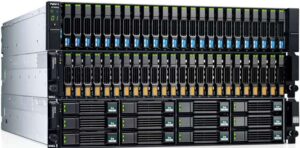
Are you looking to streamline your data management for your business while boosting efficiency and performance?
Today, every business, whether small or large, depends on effective data storage and management systems to stay ahead. With the rise of cloud computing, managing data has become both easier and more flexible.
One of the most exciting innovations in data storage is the hybrid cloud server. Combining the control and security of traditional on-premise systems with the limitless scalability of the cloud, hybrid cloud servers offer a powerful solution for businesses dealing with large amounts of data.
But how do hybrid cloud servers outperform traditional systems, and why are they rapidly becoming the preferred choice for businesses?
In this article, we will explore the advantages of hybrid cloud servers and how they are transforming the way businesses handle data-driven tasks. Let’s dive in!
Hybrid Cloud Servers: A Game-Changer for Data Management
A hybrid cloud server is a combination of private and public cloud infrastructures, linked together by technology that allows data and applications to move between them.
- Private Cloud: The private cloud is dedicated to one business or organization, offering more control over security and compliance.
- Public Cloud: The public cloud is a shared resource provided by a third-party provider, offering scalability and cost-efficiency.
The most recent forecast from Gartner, Inc. projects that global end-user spending on public cloud services will reach $723.4 billion in 2025, up from $595.7 billion in 2024.
Unlocking Unmatched Flexibility and Scalability
One of the most significant advantages of hybrid cloud servers over traditional systems is their flexibility and scalability. Traditional on-premise servers can handle a certain amount of data, but they are limited in capacity. When you run out of space or need more power, you either have to purchase more hardware or experience slowdowns.
Hybrid cloud servers provide a more dynamic solution.
- On-demand Resources: With a hybrid cloud server, businesses can scale their resources up or down as needed. If the company faces a sudden surge in traffic or data, the cloud portion of the system can quickly adjust to handle the demand.
- Cost-Effective: Rather than buying expensive hardware to prepare for peak demand, companies can use the public cloud to handle overflow, paying only for what they use. This makes it easier to control costs while still having the flexibility to grow.
Boosting Performance and Speed for Critical Data Tasks
When it comes to data-driven tasks, performance and speed are crucial. Traditional servers may perform well in controlled environments but often struggle when handling complex tasks or a high volume of data. Hybrid cloud servers, however, can balance workloads efficiently between private and public clouds, ensuring optimal performance.
- Optimized Workloads: Hybrid cloud servers can allocate tasks based on the best environment for each one. For example, high-performance tasks can be processed on the private cloud, while more routine or less demanding tasks are offloaded to the public cloud.
- Faster Data Processing: With the hybrid setup, data can be processed closer to where it is needed. Cloud resources allow faster data retrieval, leading to faster decision-making and more responsive applications.
Ensuring Robust Security and Compliance
Data security is a major concern for any business, particularly those that handle sensitive customer information or are subject to strict compliance regulations. Traditional servers offer control over security but can be vulnerable if not managed properly. Hybrid cloud servers strike the perfect balance between control and security.
- Sensitive Data in the Private Cloud: With a hybrid cloud, businesses can store sensitive data on the private cloud, where they have complete control over access and security measures. This ensures that confidential information stays protected.
- Public Cloud for Less Sensitive Data: Less sensitive data can be processed in the public cloud, where security measures are still strong but the level of protection is more cost-effective.
Disaster Recovery and Uninterrupted Business Continuity
Every business, no matter how small, is at risk of data loss due to system failures, cyberattacks, or natural disasters. A major advantage of hybrid cloud servers over traditional systems is their ability to provide robust disaster recovery and business continuity options.
- Backup in the Cloud: With a hybrid cloud server, critical data can be backed up automatically to the public cloud, ensuring that it is safe even if something happens to the on-premise infrastructure.
- Reduced Downtime: If there is a failure in the private cloud system, data can be quickly switched to the public cloud, minimizing downtime and disruption to business operations.
Cost Efficiency and ROI
When it comes to cost, businesses need a solution that offers both affordability and high performance. Traditional systems often require significant upfront investments in hardware, maintenance, and upgrades. In contrast, hybrid cloud servers offer a more flexible and cost-effective model.
- Pay-as-You-Go: With hybrid cloud, businesses only pay for the resources they use. This pay-as-you-go model helps companies avoid the high costs associated with maintaining physical infrastructure.
- Reduced Maintenance Costs: Traditional servers require continuous maintenance and IT staff to ensure they are running smoothly. With hybrid cloud, many of these responsibilities shift to the cloud provider, reducing the overall maintenance costs.
- Higher ROI: Hybrid cloud servers allow businesses to maximize their existing infrastructure while benefiting from the scalability and flexibility of the cloud.
Streamlined Collaboration and Accessibility
In today’s business environment, teams need to collaborate seamlessly, regardless of their location. Traditional on-premise systems can be restrictive in this regard, requiring teams to be physically present to access data. Hybrid cloud servers, however, provide the flexibility needed for modern teams.
- Remote Access: With a hybrid cloud, employees can access data from anywhere, whether they are in the office or working remotely. This flexibility is especially important in today’s increasingly digital and remote work environment.
- Real-Time Collaboration: Cloud-based collaboration tools integrated with hybrid cloud systems allow teams to work together in real time, increasing productivity and efficiency.
- Data Sharing: Cloud environments make it easier for businesses to share data between departments, clients, or partners. This improves communication and helps speed up decision-making processes.
Conclusion: The Future of Data Management Lies in Hybrid Cloud Servers
Hybrid cloud servers are changing the way businesses manage and process data. They offer flexibility, scalability, and enhanced performance that traditional systems simply cannot match. From improved security to disaster recovery, hybrid cloud servers are becoming the go-to solution for businesses looking to stay competitive in the data-driven world.
By combining the best features of both private and public clouds, hybrid cloud servers provide a more efficient, cost-effective, and reliable way to handle data-driven tasks.
If you’re looking to improve your business’s data infrastructure, a hybrid cloud server may be the right solution to help you stay ahead of the curve.
Read more: 5 Reasons Direct Attached Storage is Perfect for SMBs






